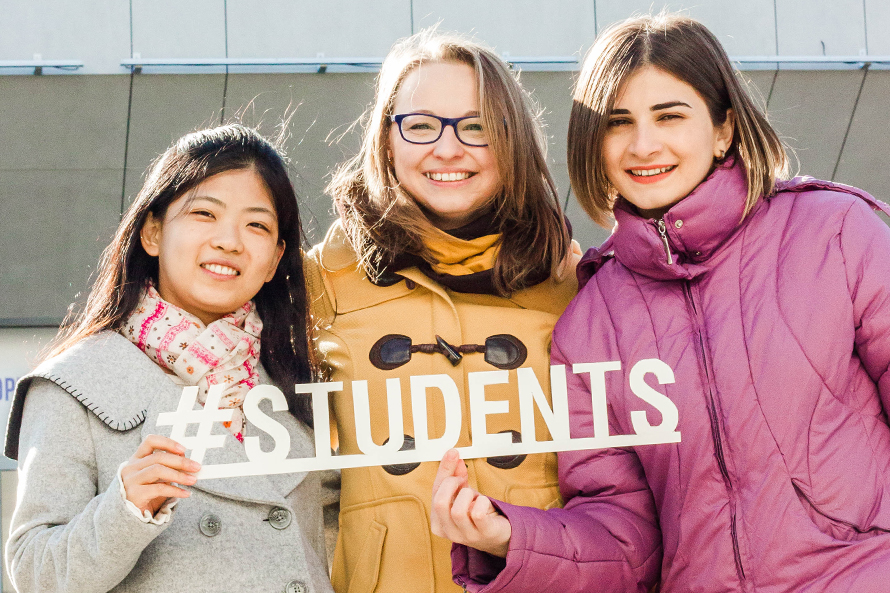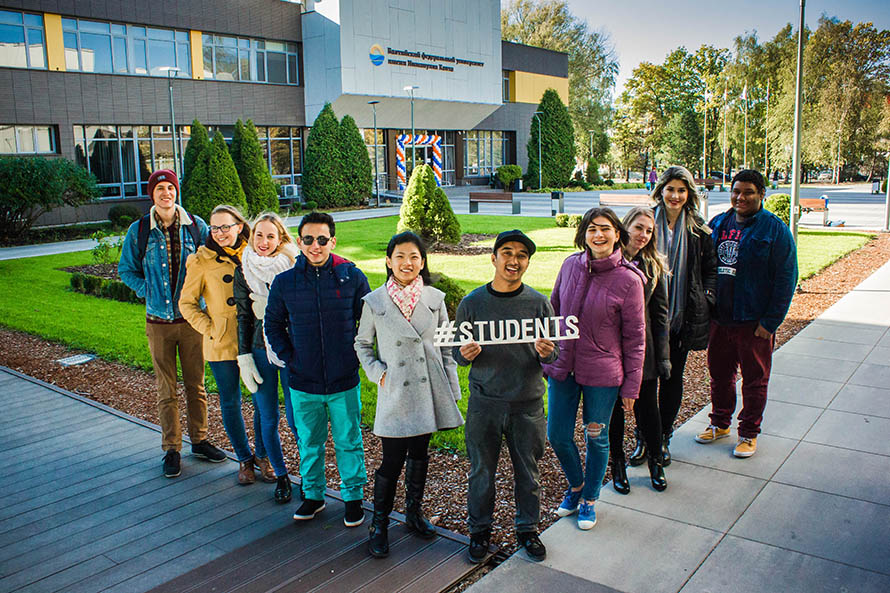Immanuel Kant Baltic Federal University (IKBFU) is located in Kaliningrad in Russia’s westernmost region. First Vice-Rector, Vice-Rector for Academic Affairs Irina Kuksa tells what the university can offer to international prospective students.
– How many international students study at the university?
– We have 381 foreign students studying at IKBFU at present; another 44 are taking preparatory courses. While understanding that this figure does not look impressive I wish to point out that 5.6 percent of international students is a decent share for a small university such as IKBFU. Plans are in place double their number within the next three years.
– What countries does a majority of international students come from?
– The region accommodating the university has been taking migrants due to its historical background. In the 1990s, it was a destination for settlers from former Soviet republics, including Kazakhstan. They must be telling their friends about the university now, also, people can find out about it through the grapevine, so the bulk of international students are from Kazakhstan. Latvian students make up IKBFU’s second largest international students’ community which is natural given the university location; Uzbeks and Lithuanians are the 3rd and 4th largest foreign communities, respectively. Generally speaking, countries of the Commonwealth of Independent States and Baltic States are best represented at our university. Recently, we’ve had an increasing inflow of students from India, China, Brazil, Columbia, Iran and Egypt.

© IKBFU
– Which countries’ students would you like to see at the university?
– We want to have more students from Baltic states. I’d say it is our mission. Students from Baltic countries find it advantageous to study at IKBFU; it is located in the same region which makes it easier to settle many issues concerning social and living conditions. We’re developing good relations with Latin American countries. IKBFU has several students from Brazil and Columbia; we wish to promote ties on that track. We’re also interested in Southeast Asia taking a closer look at countries in the region. IKBFU plans to work with prospective students from India; we’ve already developed a programme in nursing care in English; this field is very popular in India. Incidentally, IKBFU is one of the few multidisciplinary universities offering this major.
– Is it a medical programme?
– Yes, it is six-year doctor training programme; tuition in the first two years is fully in English; we’re launching the programme from 1 September. We are ready to enrol 45 people; however, the number of applicants has exceeded 100, so we roughly have two applicants competing for a place on this programme. IKBFU is on the list of universities approved by the Medical Council of India which will simplify the recognition of Indian students’ IKBFU diplomas in their home country. Prospective students from former Soviet republics, Brazil, China, and South Africa have displayed an interest in the programme.

© IKBFU
– What other fields of study are popular with foreigners?
Aside from medical care, the top ten include liberal arts: linguistics, journalism, tourism, economics and law. Services for Oil and Gas Industry and Housing and Utilities Services are most sought-after engineering and technology fields. Transport process technologies “Logistics” and “Road Transportation Management” are popular as well. Bioengineering and Bioinformatics is a much needed major. Also, we plan to develop computer science as a promising discipline.
– Do you have programmes in English aside from Nursing Care?
– We’re now developing master’s programmes in Functional Nanomaterials and Artificial Genetic Systems and internship and postgraduate programmes in Clinical Pathology taught entirely in English. IKBFU is launching a master’s programme in Audiovisual Translation in English. Some programmes are taught partially in English, such as Module Emmanuel Kant’s Philosophy and Russian as a Foreign Language. Not all students can come for full-time studies, so we develop short programmes for them. IKBFU policy is to promote Russian language space, culture and education which explains a relatively small number of programmes in English. It is one of the social functions of our university which is located practically in Europe.

© IKBFU
– What are your outreach practices for international prospective students?
We interact with prospective students from Poland, France, Belgium and Germany, i.e. from the countries close to Kaliningrad Region. We mostly work through the associations of Russian language and literature teachers and Russian communities in those states. IKBFU has an office in Riga which has operated since 2007. The university also opened an IKBFU alumni association in Latvia in 2017. IKBFU graduates in France set up a similar association.
– We’ve developed such annual outreach events as career guidance seminars for prospective students from Latvia and Lithuania. Young people travel to IKBFU in groups together with their parents to get to know the university and the faculty and see the dormitories and the city. IKBFU participates in education exhibitions in CIS countries often combining them with career guidance. We meet with prospective students and offer them to take practice tests. We’re also improving the English version of IKBFU website; actually, we’re creating it from scratch.
– Do you have academic competitions?
– Yes, we have two. The first is a competition in Russian language, literature and culture; its results exempt students from IKBFU entrance tests or give extra points. The competition has the initial online stage involving 2,000 to 3,000 Russian language learners from 25 countries. The second stage takes place onsite; students pay travel costs and we provide them with the essentials and prepare an interesting programme; the winners get gift editions of Russian writers’ works as well as souvenirs. “Russian Dictation” is the second competition. The University of Gdansk once requested us to carry out such a contest which has become an annual event for about 1,000 people since. The winners get presents and score extra points which carry over to IKBFU entrance examination in Russian.

© IKBFU
– Do you have summer schools?
– We have a long list of schools. IKBFU is a modern and mobile university, so we like to come up with short programmes reflecting the latest topics which are popular with international students. This year, IKBFU will run the fifth summer school “Lawyer’s Professional Skills: Road to Success” that draws a keen interest. We invite top practitioners: professors from Stanford University and University of California, Berkeley. They come over and interact with our students practicing essential lawyer’s skills, in the first place communicative ones. The programme usually gathers 80 to 100 people from five to seven countries; languages of instruction are Russian and English.
Being close to Europe, we run summer school of International European research (in the fields of law, economics, political science and media) every year. IKBF’s “Kaliningrad, a Cultural Bridge Between Russia and Europe” interdisciplinary socio-humanitarian school is popular as well. Russian as a Foreign Language is another established intensive school. Many young people come for technical short programmes in English: Magnetic Nanomaterials, Intelligent Nanomaterials and X-Ray Optics. In 2017, IKBFU will run the 4th Hybrid Technology and Biomedical Applications interdisciplinary school. It is attended by biologists, physicists, chemists and medics who have an opportunity to develop original technologies using our equipment. Short programme training is free of charge; students pay their fares and the rent (we provide dormitory accommodation at 300 to 500 roubles per day).
– Speaking of dormitories, what can you say about students’ living conditions?
– Bachelor’s students live in the same dormitories as Russian students. All the buildings have been renovated recently; all provide comfortable conditions. Two- and three-occupant accommodation is available; most dormitories are block-type, i.e. one bathroom and toilet per two to four rooms. Master’s students are accommodated in apartment-style dormitories: two to three people share studio apartments with modern conveniencies and bathroom, lavatory and kitchen facilities. All the dormitories are in proximity to the teaching blocks. Free wi-fi is available on the campus. IKBFU has a clinico-diagnostic centre, a swimming pool, a stadium, a roofed fitness and health centre and some 20 sport societies.

© IKBFU
– What leisure activities can be pursued aside from sports?
– There are many options: we have a KVN stand-up comedy group, a student research society, a volunteer organisation, a student’s council, and a trade union committee. We carry out many events such as KantianaStart, a week-long forum for students to come up with their ideas and realise them. IKBFU recently implemented a KantianaStart project to find students with good English language skills and train them as tutors for foreigners.
– Do you have Support Service?
– We have decentralised help centres providing assistance in specific areas. A special service handles dormitory residents’ issues; there is a unit for migration issues, etc.

© IKBFU
– Could you tell more about Kaliningrad?
– We joke that our city is a miniature Russia; it is home to residents from many Russian regions and nationalities. That is why students from any county feel comfortable here. The city has an interesting history: Kaliningrad became part of Russia after World War II. Many buildings had been ruined, but the city’s modern appearance has retained some old-style architecture. It includes fortifications, the city gate and the Cathedral on Kant Island where we award certificates of graduation. We have unique museums of world ocean and amber (the region accounts for 90 percent of the world’s amber reserves). Kalinigrad is a maritime city at 15 minutes’ drive from the Baltic Sea coast. The climate here is quite mild, temperate continental. We have a significant portion of young people: every 20th Kaliningrad Region resident is a student at this or that university.
– What advice do you have for international prospective students?
– Our first suggestion is to choose the university which you wish to enter and then select an education programme. IKBFU website lists the application documents with filled-in samples. The documents have to be carefully prepared. Errors in documents are not infrequent. Here’s another piece of advice: feel free to ask us any questions concerning admission, tuition, housing, living conditions, travel costs etc. Use the pop-up form in the lower right hand corner to write us in Russian or English.

© IKBFU
– What advantages does IKBFU offer to international prospective students?
– IKBFU is a small university, so we have a democratic environment and a warm, almost home-like atmosphere; everybody knows each other, everybody is ready to help in any issue. Any student can meet with the rector or vice-rector to make suggestions. In the same manner, students feel free to communicate with professors, use modern equipment and conduct joint research together with acclaimed scientists.
The university has unique education programmes, such as High Technology and Innovative Business Systems, an interdisciplinary programme for biologists, programmers and economists. The key objective is to train specialists who will be able to develop, implement and commercialise an innovative project. We also have interesting programmes in neuroscience, nanomaterials, magnetic materials, conference translation, and audiovisual translation. Of course, students eye not only the university but also our region which is attractive in terms of location, comfort, safety and well-developed research, social and housing infrastructure. The bottom line is that we have comfortable living conditions and that studying here is interesting.



























































